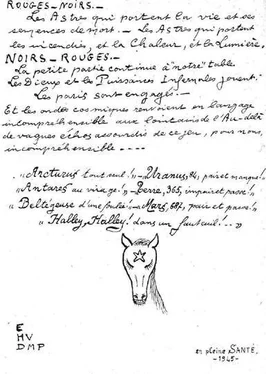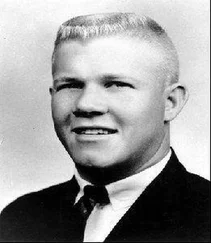“Yes, you know these things better than me, as I am not a forensic scientist,” Petiot mumbled. “Diptera and coleoptera … hmmm. This is fascinating. Could you tell me more about it?” When Piédelièvre responded that the subject did not pertain to the case, Petiot agreed and invited himself over after the trial to discuss the matter further.
Professor Griffon then testified that he had not found any evidence of poison. But “that does not mean that there wasn’t any,” he added, noting that the small triangular room was well suited to serving as a gas chamber.
“But there was a gap of over two centimeters under the door,” Floriot objected.
“It would have been easy to close it,” Griffon said, suggesting a simple rug.
“That’s only a hypothesis. Can you produce this rug?”
“If it were gas, then what kind of gas?” Dupin asked.
“Almost any one you would like, except perhaps lighting gas because we found no trace of equipment.” Griffon then reminded the court that Petiot’s apartment on rue Caumartin contained “a pharmaceutical arsenal of uncommon size” with an “abnormally high proportion of narcotics.”
“They were used for painless deliveries,” Petiot said.
“Did you find a single poison at rue Caumartin?” Floriot asked.
“Morphine.”
“Morphine is not a poison.”
“That depends upon the dose.”
“Did you find any morphine at rue Le Sueur?”
“No.”
“I see,” Floriot said. “No poison at rue Le Sueur. No way to block the opening in this famous gas chamber of yours. Nothing at all? Thank you very much.”
The psychiatrists who had examined Petiot came next, including Dr. Georges Paul Génil Perrin, who had noted Petiot’s attempts to pretend he was insane to escape punishment.
“I have examined Petiot from a mental point of view,” Génil Perrin said, “and found him endowed with a lively intelligence and a remarkable gift for repartee …,” a statement that drew laughter from members of the audience and prompted Dupin to note that he had observed this quality himself even without psychiatric training. Génil Perrin then testified about Petiot’s troubled or “arrested moral development,” before concluding, as in his previous report, that the defendant was “fully responsible for his acts.”
Another psychiatrist, Dr. Paul Gouriou, testified that Petiot was not “a monster or a madman,” but rather “perverse, amoral, a scamp and a simulator. In times of trouble, he has attempted to avoid prosecution by faking insanity.” Petiot’s “lack of moral education,” he added, “has allowed him to develop a taste for evil.”
Floriot objected that the doctor’s patients found him quite the opposite.
“I know of doctors whose mental disequilibrium is expressed by an increased devotion to their patients.”
“Did he pretend to be insane with you?” Floriot asked.
“No, he lied about many points, but not that.”
“You concluded that Petiot completed his studies in a ‘mysterious’ fashion. Do you know his examination results?”
“I saw his grades. He had ‘mediocre’ in dissection,” Gouriou said to laughter in the courtroom. “His thesis received the grade ‘très bien,’ but that is done easily. A thesis can be bought if desired. At any rate, it is based on books and does not give an indication of the personal worth of a physician.”
Floriot pointed out that the witness was making insinuations without proof. He then asked the expert if, in his examination of Petiot’s relatives, he found anything unusual about his sister. After a slight hesitation, Gouriou said, “She is in good health.”
“Sorry, but Petiot does not have a sister.”
The courtroom erupted in laughter, prompting Leser to call for a recess.
THE trial recommenced with the prominent graphologist Professor Edouard de Rougemont, who was asked to testify about the handwriting of the letters supposedly sent by Van Bever, Khaït, Braunberger, and Hotin. In each case, Rougemont believed the letters were genuine, though the text was in disagreement with the actual sentiments of the writer. Rougemont detected a high degree of stress, probably even dictation under duress or the influence of drugs.
Floriot asked if the scholar could really draw these conclusions based only on looking at the handwriting. When Rougemont answered yes, Floriot scribbled something on his pad, ripped off the sheet, and handed it to the expert. Would he mind informing the court if Floriot believed what he had written? Rougemont read the paper and then refused to say anything. Floriot had written: “Monsieur de Rougemont is a great scholar who never makes a mistake.”
“If we had asked Petiot to write out his story and Monsieur de Rougemont to read it, we could have dispensed with this whole trial,” Floriot said, to another round of laughter in the courtroom.
Colonel André Dewavrin, director of the DGER intelligence service under General de Gaulle, was scheduled to testify. When the bailiff called his name, however, another man stood and announced that he represented Dewavrin. Président Leser was often criticized during the trial for his relaxed courtroom, but he was not going to accept a spokesman for a witness. Floriot also objected, claiming that the defense was counting on Colonel Dewavrin’s testimony, because as de Gaulle’s chief of intelligence, he could officially confirm Petiot’s work as a Resistance fighter.
Instead, a witness with much greater potential for damaging Petiot took the stand, Jacques Yonnet, who had published the article “Petiot, Soldier of the Third Reich,” which had played an important role in the capture of the physician. Yonnet had also investigated Petiot’s claims to have fought Germans and their collaborators, and drafted his summary for the court, which had concluded that Petiot had no Resistance credentials whatsoever.
Asked by Floriot about the newspaper article, Yonnet admitted that the piece was based on a copy of a report that he claimed later to find out had contained many falsehoods. He had published the article with the caveat that he could not vouch for all the allegations. As for the investigation, which Floriot criticized for its lack of objectivity, Yonnet stood by its results.
Petiot could not have known any of the people he mentioned, such as Brossolette, Cumuleau, or the other members of Arc-en-Ciel. Yonnet and his colleague Brouard could not find a single person who had heard of his so-called Fly-Tox organization, which moreover was not included on the files of Fighting France that were housed at 76 Avenue Henri-Martin. Fly-Tox, Yonnet concluded, had not existed other than in Petiot’s imagination.
Despite Yonnet’s sweeping claim, the files of the Brigade Criminelle show that several people had in fact heard of Fly-Tox, including the widows of Brossolette and Cumuleau. Still, no evidence of the group’s existence has ever been made public, and, if Fly-Tox existed, did Petiot really belong to it, or did he just exploit it for his own purposes?
It is unfortunate that Dewavrin did not appear at the Petiot trial. He could have helped clear up the matter of Petiot’s Resistance credentials, or lack thereof. Instead, his absence only raised questions. Dewavrin did not refer to the episode in his memoirs and never spoke of it, at least publicly, except for one time. On that occasion, he gave a terse rejection of Petiot: “Organized Resistance has never, for any reason whatsoever, had dealings with Dr. Petiot.”
Véron asked the defendant to elaborate on his claim of killing sixty-three people, thirty-three collaborators and thirty German soldiers. Beginning with the latter, Véron wanted to know how specifically Petiot had killed them. Petiot said vaguely that many of them had been his patients. Véron countered that Petiot was not authorized to treat German citizens.
Читать дальше












